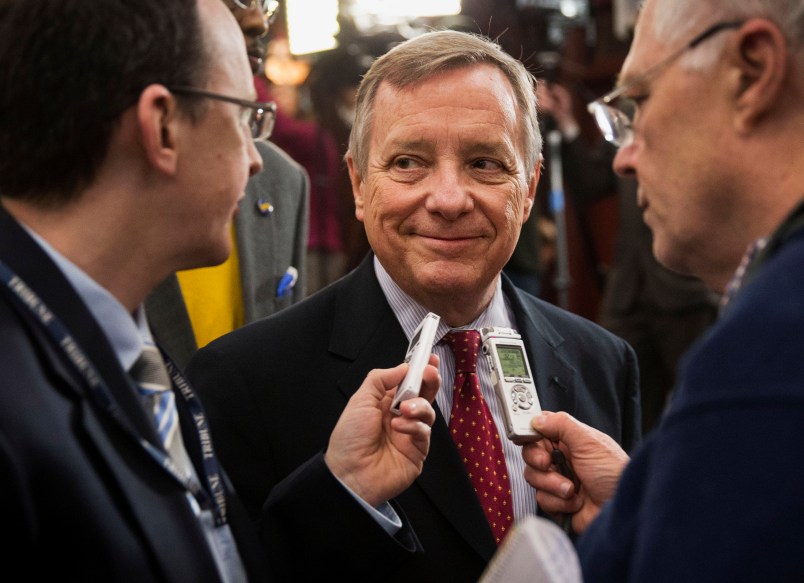When Senate Minority Whip Dick Durbin (D-IL) took to his chamber’s floor on Wednesday he warned that the now minority Senate Democrats “had no intention of just rolling over” but added that the “gratuitous obstruction and wanton filibustering” of Republicans in the last Congress wouldn’t be something Democrats would mimic now, pointing toward a big question about the 114th Congress.
“I remind everybody that last Congress the Republicans mounted an unprecedented filibuster of the nominee for Secretary of Defense. Imagine what we could do if we worked together,” Durbin said. “I challenge my friend, the Majority Leader, to change course and work with Senate Democrats in confirming the President’s nominees in the 114th Congress.”
Durbin was highlighting a fact that Democrats hoped they wouldn’t have to deal with and now must: when and how to use the filibuster given that Republicans control both the House of Representatives and the Senate. Even with the historic changes to the filibuster on judicial and executive nominees, it’s still a potent tool, and a valuable one for Democrats who find themselves in the minority.
“My hunch is that Democrats will back away from some of the outer extremes of the GOP’s exploitation of the cloture rule. Keep in mind that the GOP exploited the rule quite often on nominations,” George Washington University political science professor Sarah Binder told TPM in an email interview. Binder suspected that’s what Durbin meant when he said “gratuitous obstruction” since Republicans mostly voted against cloture but also voted to confirm most nominees.
“In that context, there’s very little (if any) incentive for Democrats to insist on cloture for getting to confirmation votes for President Obama’s nominees,” Binder said. “So right off the bat, change in party control could well eliminate a portion of the number of times McConnell feels compelled to file for cloture and take those cloture votes.”
There’s also the question of Republican legislation which will have a much easier time making its way from one chamber to the next. Democrats maintain that they will not practice the regular filibustering Senate Republicans did when they were in the minority and instead say it will happen only when Senate GOPers take up radical Tea Party legislation.
“If [Senate Majority] Leader [Mitch] McConnell is willing to stare down the Tea Party and advance mainstream legislation that benefits the middle-class, he’ll find Democrats ready and willing to work with him,” a senior Democratic leadership aide told TPM. “If, however, he turns the keys over to the Tea Party and pursues an extreme agenda that repeals Obamacare, dismantles Dodd-Frank and provides more tax breaks for special interests, Democrats will fight back tooth and nail to oppose the Republican agenda.”
The aide added that it’s not a question of “‘do we block everything or not,’ it’s an issue by issue calculation. We’re going to take each bill that the Republicans advance one issue at a time and let the chips fall where they may.”
Color Republicans skeptical.
“It’s hard to believe anything they say on filibusters,” a top Senate GOP leadership aide said of Democrats to TPM in a brief response.
But Binder said it really depends on what legislation McConnell decides to bring to the floor.
“On legislative measures, I think Democrats’ likelihood of filibustering GOP initiatives (particularly on motions to proceed to their consideration) will largely depend on precisely what issues McConnell attempts to bring to the floor and how open he is to allowing Democrats to offer amendments on their priorities,” Binder said.
A big question related to that is if McConnell will actually follow through on his vows to bring the Senate back to a chamber that emphasizes voting on amendments and debate and also where Senate power is sourced in committees.
“My hunch is that McConnell even with the best of intentions will find this hard to pull off — especially when interspersed with efforts to repeal ACA and Dodd-Frank, etc.,” Binder said.
But even just a few days into Congress Democrats were already grumbling, including Reid communications director Adam Jentleson, when a Keystone XL pipeline bill had already been read twice making it eligible for floor proceedings while Senate committees were still being formed.
Tonight Senator McConnell basically made it official that no committee will hold a hearing on Keystone before it comes to the floor.
— Adam Jentleson (@AJentleson) January 7, 2015
It’s all still a contrast from previous Congresses. The mantle of the party fighting to block legislation has switched hands a few times, Binder noted.
“Senators (lawmakers more generally) readily change tactics as their circumstances change and find ways to rationalize and justify their change in views,” Binder told TPM. “(Think GOP when Bill Frist threatened to go nuclear vs. GOP when Reid pulled the trigger.)”









